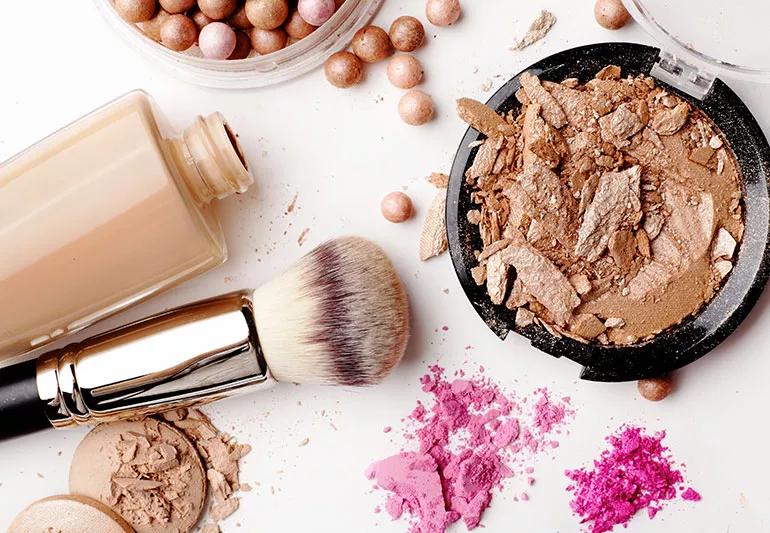Keeping brushes clean and new can prevent bacteria growth

Image content: This image is available to view online.
View image online (https://assets.clevelandclinic.org/transform/d091edd6-ade8-492d-86ee-fe9710820385/DirtyMakeUpBrushes-592394232-770x533-1_jpg)
A birds-eye-view of a crushed makeup and a makeup brush
You may practice the most scrupulous face-washing habits, cleaning carefully every morning and removing your makeup at night. But if you aren’t washing your makeup brushes regularly too, you might be undermining all that good work.
Advertisement
Cleveland Clinic is a non-profit academic medical center. Advertising on our site helps support our mission. We do not endorse non-Cleveland Clinic products or services. Policy
Every time you touch an unwashed brush to your face, you’re not just applying makeup. You’re also applying dirt, oil and old makeup. And if you store your brushes in a cup on your bathroom counter or just out in the open where you get ready, they also can acquire hairspray, perfume, dust, sneezes and other stuff floating around in your bathroom’s air.
“Keeping your makeup tools clean can go a long way toward keeping harmful bacteria from getting on your face,” says dermatologist Melissa Piliang, MD.
You may think that the foundation or makeup you use is causing your skin to break out. If it’s old, by all means, throw it out. But before you go out and spend money on a bunch of new and expensive beauty products, try giving your brushes a thorough cleaning first — bacteria-filled brushes can just as easily be the culprit.
“How often you should wash your brushes depends on what you’re using,” Dr. Piliang says.
“You will want to wash more often your brushes used for wet products or products with a lot of liquid like concealer and foundation say once a week,” Dr. Piliang says. “That will clean the product off and let the brush do its function better.”
“Any products that you use around your eyes should be washed every two weeks, even if it’s a dry product like eye shadow or eyeliner because the eyes are more prone to infection,” Dr. Piliang says.
Advertisement
Other brushes used for dry cosmetics like powder that you don’t use around your eyes can be washed once a month, she adds.
“If you use sponges to apply liquid makeup, pay special attention to keeping them clean,” she says. The sponge absorbs the makeup and the moisture potentially can lead to bacteria and yeast overgrowth.
“Most makeup products are formulated with preservatives to keep bacteria and yeast from growing. But if you let the makeup build up over time and it sits there for months and months, you could develop a bacterial infection if you’ve had a cut in your skin,” says Dr. Piliang.
Dr. Piliang recommends using mild soap, like dish soap or even shampoo, to wash your makeup tools and utensils.
Clean them gently with soap in warm water and let them sit on a towel to dry for a day or overnight.
Sometimes it might be best just to throw out your makeup sponges, brushes or applicators and buy new ones. When the tips of the brushes look frayed or worn, or when the brush has lost its shape, they won’t function as well as they should anyway.
If you develop a very red eye, eye drainage or any eye pain after applying makeup, it’s time to call your doctor.
Advertisement

Sign up for our Health Essentials emails for expert guidance on nutrition, fitness, sleep, skin care and more.
Learn more about our editorial process.
Advertisement
Birth control pills with estrogen are best for fighting hormonal acne
Hormone fluctuations impact oil and sebum production, creating painful, tender pimples
Look for a formula with either benzoyl peroxide or salicylic acid
Those bumps on your butt probably aren’t pimples
OTCs that can help treat teen acne, and getting into a skin care routine, can go a long way
The location of your acne can tell you a lot about what’s causing it and how to treat it
Why you shouldn’t pop a pimple on your nose or near your mouth
Better, safer treatments are available
Type 2 diabetes isn’t inevitable with these dietary changes
Applying a hot or cold compress can help with pain
Pump up your iron intake with foods like tuna, tofu and turkey